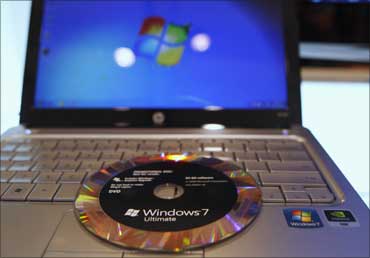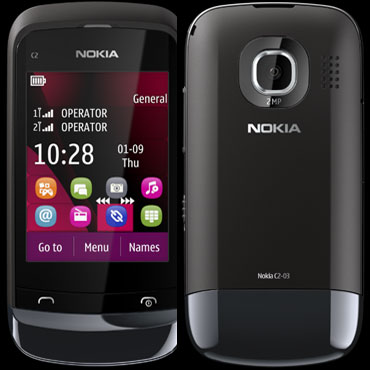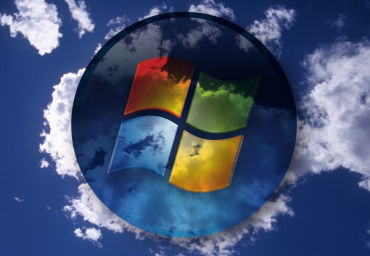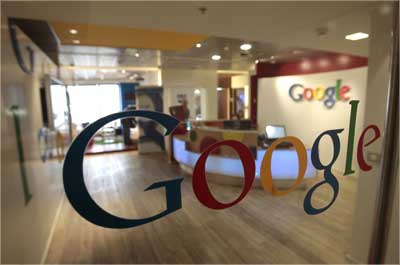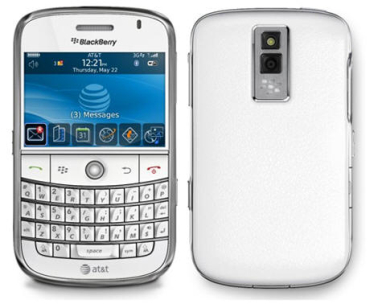 | « Back to article | Print this article |
Will Microsoft now woo Nokia?
Rajeev Srinivasan on radical shake-ups in the cellular handset industry.
The surprise news of Google's proposed purchase of Motorola Mobility for $12.5 billion on August 15 demonstrates how dramatically the landscape is changing in the world of smartphones within the last few weeks.
First, there was Nokia's loss of its top spot in smartphones to Apple that denoted the passing of the torch from the incumbent to the insurgent (WSJ, July 29: Nokia cedes smartphone crown to Apple, Samsung).
It made me personally sad, because I was a loyal Nokia user. Nokia's fall from grace has been swift and sharp: its share has dropped from a commanding 45 per cent or so to about 16 per cent in a matter of just two years.
Second, there is all the patent litigation going on. Google's free and open-source Android software, a surprise success, now has the leading market share in platforms, having become a favourite with device makers.
Apple's iOS, the comparable platform software on iPhones and iPads, is of course not available to any third party device makers.
Click NEXT to read on . . .
Will Microsoft now woo Nokia?
As a result, everybody is gunning for Android based on alleged intellectual property violation. Already some device makers are paying Microsoft $15 per copy of Android, which is a nice little side income, of course.
Apple has got the European Union to stop the Samsung Galaxy tablet from being sold there, and is trying similar litigation in other countries. Oracle has stepped in, saying Android violates Java patents that it acquired when it bought Sun Microsystems last year.
Google has also been complaining that several companies, including Apple and Microsoft are 'ganging up' on it in unfair and predatory violation of normal business practices.
They, in fact, outbid Google on the large patent portfolio of Nortel, a defunct telecom switch vendor, which might have been useful for Google to defend itself.
This sort of patent litigation (some might call it with disapproval 'patent trolling') does work, and enables firms to extract (some might say 'extort') large sums as royalty payments from competitors.
Click NEXT to read on . . .
Will Microsoft now woo Nokia?
BlackBerry-maker RIM was forced to cough up $600 million a few years ago to settle patent suits from a company whose business model is to buy up intellectual property and sue others.
Thus Motorola Mobility must have looked a particularly tempting target for Google, so much so that it paid a 63 per cent premium over market prices in a juicy all-cash deal.
The prize? Motorola's cache of 17,000 patents, which could be a potent force in the typical bartering that large technology companies do these days.
That is the good news: this may allow Android to survive. Which must be making various Android handset makers such as HTC, Samsung, and Sony Ericsson happy.
However, they will have to deal with the complexity of competing with Google in the hardware market, when Google is also their supplier for the critical platform software.
Click NEXT to read on . . .
Will Microsoft now woo Nokia?
This is not as unusual as it might seem. Even though Apple and Samsung are fighting broad legal battles, they also collaborate.
For instance, a recent teardown of the iPhone 4 suggests that out of the $180 or so component cost about 25 per cent is for Samsung parts, including the flash memory, the DRAM, and the CPU.
Nevertheless, I am sure Android OEMs will take a long, hard look at whether Motorola Mobility will now be the preferred Android device. Google has said that it will retain Motorola as a separate hardware division and it will license the software like everybody else.
This is comforting, but it may or may not be enough to keep the OEMs in the fold. They may take a look at competing software platforms, but their choices are limited: the others are all owned by device makers, with the possible exception of Microsoft's Windows Phone 7; but then Microsoft is very friendly with Nokia.
Will Google be able to pull off the trick of transitioning from a software company to a hardware-software company? Perhaps.
Click NEXT to read on . . .
Will Microsoft now woo Nokia?
Oracle has done it; but very few can manage the operations focus of a hardware company with the freewheeling nature of software companies.
There is also the model of the PC industry that is fresh in everybody's memory: Microsoft and Intel prospered by sticking to their own niches in the value chain, and by carefully avoiding vertical integration.
Now Google is integrating all the pieces of the puzzle, much like Apple has done with so much success. I am sure those at Google are salivating at Apple's margins (in the teardown mentioned above, they make $360 on a component cost of $180).
But it is difficult managing all aspects of the 'stack', as for example Sun Microsystems found out: it becomes a kind of imperial over-stretch, and you get exhausted from trying to own all aspects of the value chain yourself instead of leaving large chunks of it to third parties.
Actually this could have the interesting side effect of making Nokia more appealing to Microsoft for a takeover. Microsoft has the cash, and Nokia, with its plunging stock, is worth somewhere around $20 billion.
Click NEXT to read on . . .
Will Microsoft now woo Nokia?
Microsoft may reason that since they do not have too many hardware partners now, it will not be disruptive to buy Nokia.
If that happens, there will be a plethora of giants with integrated operations: Google with Motorola Mobility and Android; Apple with its hardware and iOS; HP with its Palm acquisition and WebOS; RIM with BlackBerry and the newly-acquired QNX; Microsoft with Nokia and Windows Phone 7. That should be an interesting matchup.
There really isn't enough room for so many players. It is likely that there will be only three players in an oligopoly when the dust settles.
The possibilities are: Apple, Google and a third player. The pursuit of that third slot is where there will be blood on the streets -- who will win, RIM or HP or Microsoft? A lot of money, not to mention leadership in the rapidly-converging computing and cellular telephony market, rides on the answer to that.
